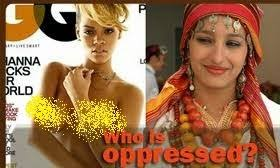Generally it is believed that in Islam the women are mistreated, their status is lower than men and they do not enjoy equal rights. Such negative perceptions has been created by the ignorant and enemies of Islam, after having failed in the ideological front, however the cultural treatment meted to the women in some of the Muslim societies has provided the basis for such perception.
Before the advent of Islam the status of women in earlier civilizations was very low to the extent that they were denied basic human dignity. A cursory look at that would highlight the respectable position granted to women by Islam. The women were degraded and were denied all rights under the Babylonian law. If a man murdered a woman, instead of him being punished, his wife was put to death. In the Greek Civilization, women were deprived of all rights and were looked down upon. In Greek mythology, an ‘imaginary woman’ called ‘Pandora’ is the root cause of misfortune of human beings. The Greeks considered women to be subhuman to the extent that they were considered impure, and they were bought and sold in marketplaces.
A woman could not refuse a husband chosen by her guardian and she could not disobey her husband in anyway. Later, they acquired a somewhat batter status, but they remained inferior to men. Though chastity of women was precious, and women were held in high esteem, the Greeks were later overwhelmed by ego and sexual perversions. Prostitution became a regular practice amongst all classes of Greek society.
When Roman Civilization was at the zenith of its ‘glory’, a man even had the right to take the life of his wife. Prostitution and nudity were common amongst the Romans. Under the Roman Empire, women did not have the right to own anything. If a woman had any property of her own, it was automatically transferred to the ownership of the head of the family. Later, in the reign of Justinian (483-565 C.E), women were given the right to retain what they earned through their own work, but money from other sources (gift etc) remained with the head of family.
Christian Europe was influenced by notions that prevailed in the days of paganism about the status of women. Eve is considered responsible for the fall of Adam from grace indicated by word “Evil”.
As recently as 1805, the English law allowed the man to sell his wife. In the year 586 C.E that is when Prophet Muhammad (peace be upon him) was still a young man, the French elegies organized a convention in which they discussed whether women were human or not. They concluded that a woman was a human being created only to serve men. Even after the French Revolution, in the late 18th century, the French law continued to consider that an unmarried woman was totally unqualified to enter into any contract without the consent of her guardian.
The French law of the time stipulated that those who did not have legal status were "young boys, idiots and women.” The Egyptian considered women evil and as a sign of a devil. Before the advent of Islam, the Arabs looked down upon women and very often when a female child was born, she was buried alive. Islam uplifted the status of women and granted them their just rights 1400 years ago. If certain rights of woman are being ignored, restricted, or denied in present-day Islamic societies, it is the responsibility of the society which is not enforcing them, Islam cannot be blamed for it. The status of women in Islam is evident form the privileges granted to her.
Quran mentions some Women:
Mary (Maryam - مريم) is the only woman mentioned in the Qur'an by name . Female figures in the Qur'an are important characters and subjects of discussion in the stories and morals taught in Islam. Some of the women in the Qur'an are portrayed in a positive light, while others are condemned for their actions. The others' names come from other traditions. Most of the women in the Quran are represented as either the mothers or wives of certain leaders and prophets. Women in the Quran retained an amount of autonomy from men in some respects; for example, the Quran describes women who converted to Islam before their husbands did, or women who took an independent oath of allegiance to Prophet Muhammad (pbuh).
1 Eve
2 Wives of Noah and Lot
3 Daughters of Lots
4 Sara (سارة), Wife of Abraham
5 Aziz's Wife and the Ladies
6 Mother and sister of Moses
7 Wife of Moses
8 Asiyah, Wife of the Pharaoh
9 The Queen of Sheba (Bilqis)
10 Wife of Imran
11 Maryam (مريم)
12 Wives Of Muhammad
13 Daughters of Muhammad
14 The woman who complained to Muhammad
15 Wife of Abu Lahab "Umm Jamil bint Harb"
This site aims to educate about honorable status of women in Islam with a view to remove misconceptions, under following topics:






